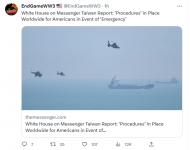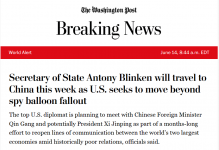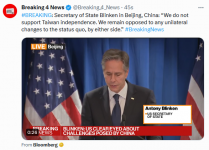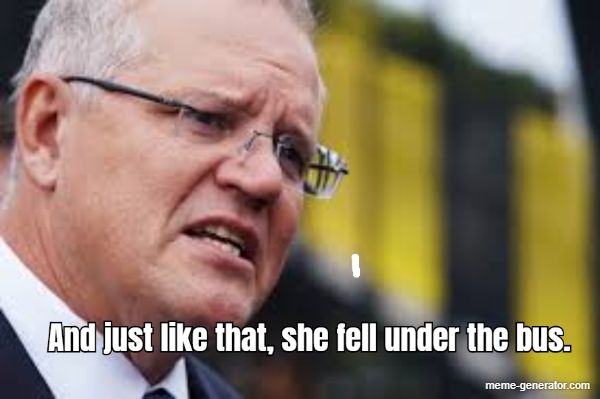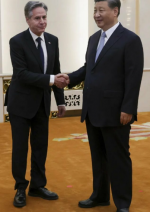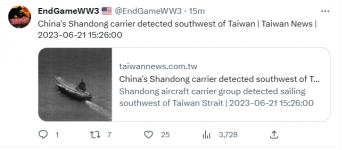CSIS
@CSIS
3m
NEW: While sanctions could impose substantial economic costs on China, they are unlikely to deter Beijing from military action against Taiwan in a crisis unless used early and more aggressively than Beijing expects, write CSIS experts.
Sunk Costs: The Difficulty of Using Sanctions to Deter China in a Taiwan Crisis
In the wake of Russia’s full-scale invasion of Ukraine in 2022, policymakers in the United States have turned to how, in concert with allies, they can deter Chinese military action against Taiwan. The foundation of this discussion is how to provide Taiwan with the necessary defensive capabilities, as well as what investments the United States must itself make to ensure that its military can repel an attack by the People’s Liberation Army (PLA).
Increasingly,
policymakers are looking at expanding the deterrent toolkit to include nonmilitary tools, including the threat and use of sanctions. Earlier this year, several U.S. lawmakers introduced a bill that would mandate a broad set of sanctions against Beijing if it launched an invasion. According to Representative Mike Gallagher (R-WI), one of the bill’s cosponsors, the
legislation “makes clear that should [Chinese leader Xi Jinping] choose to invade, the U.S. will not hesitate to respond with crippling and comprehensive economic sanctions on any person or company supporting a [Chinese Communist Party (CCP)] invasion of Taiwan.”
This shift to emphasizing the nonmilitary dimensions of a possible Taiwan conflict is welcome, given both the
potential global economic costs of a conflict and the key deterrent role these potential costs play in shaping Beijing’s calculations. The focus on sanctions signals that policymakers understand that meaningful deterrence requires signaling to the Chinese leadership that any attack on the island will result in significant military and economic costs.
Yet effectively using economic coercion to shape China’s decisionmaking begins with accepting its limitations, of which there are many:
- Western leaders would likely be wary of using crippling sanctions until it is too late for them to deter Beijing,
-
- Beijing likely already believes sanctions would be used in a conflict and would therefore have incorporated these costs into its decision to pursue military actions,
-
- the economic implications of any blockade or conflict could be so dire as to make sanctions potentially moot, and
-
- calibrating and coordinating sanctions in response to Chinese activities that fall short of an outright invasion or blockade would be particularly difficult.
This does not mean that sanctions are impotent, only that they are not a silver bullet. As will be discussed later in this commentary, if a large coalition of advanced economies can credibly signal the willingness to impose sanctions on Beijing, this can help clarify for the Chinese leadership just how devastating an attack on Taiwan would be for China’s interests and future development.
Limits of the Russia Precedent
Vladimir Putin’s decision to launch his full-scale invasion of Ukraine demonstrates the
limits of sanctions as a deterrent. While they were insufficient to discourage the attack, this failure had more to do with Putin’s false expectations about the ease with which Russia would conquer Ukraine. It is more than likely that he assumed some degree of economic and diplomatic backlash following an attack but nonetheless concluded that if the Russian military could neutralize the leadership in Kyiv and achieve early battlefield success, the result would be largely in line with the response to his 2014 invasion of Crimea.
Before the full-scale invasion, Putin’s economic officials
reportedly briefed him on the expected economic effects of Western sanctions, and their forecasts were worse than what Russia’s economy ended up experiencing. Moscow did not anticipate the full range of sanctions later imposed on Russia but nonetheless overestimated how much the Russian economy would suffer from sanctions overall. Modeling how economies respond to unprecedented shocks is difficult, but Russia’s economic performance since the sanctions is yet another reminder that economic actors can adjust under stress.
Putin decided to proceed with the invasion regardless, as he might have considered massive and escalating Western sanctions implausible given his estimation that the conflict would be over before the West could marshal and sustain the political will for such measures. The West would have been unlikely to impose greater economic costs, including on their own economies, in the face of a fait accompli. Chinese leaders in a crisis would likely try to create a similar fait accompli that undermines the apparent deterrence usefulness of severe U.S. sanctions. At a minimum, Beijing would actively signal to its economic partners, including Europe, that it would be the sanctions that would tank the global economy, not China’s actions on Taiwan.
Beijing Would Plan on Sanctions, Limiting Their Use as an Immediate Deterrent
On the surface, threats of severe sanctions on China seem less credible than they were against Russia, owing to the importance of its economy and financial system. While many multinational firms suspended operations in Russia relatively easily following Putin’s invasion, severing ties with China would be far more costly and complicated. Beijing is aware of foreign firms’ and investors’ exposure to China and is trying to counter potential foreign sanctions by sustaining such dependencies as its own
deterrence strategy.
Even with this level of confidence,
Chinese analysts still believe that the United States would initiate economic sanctions in a crisis over Taiwan. It can be inferred that Chinese leaders likely share this assumption, although it is unclear precisely how severe they expect the sanctions to be, and how many allies and partners would join the United States. As such, China’s leaders have already incorporated some degree of economic sanctions into their baseline calculations of the cost of a potential strike on Taiwan.
This does not mean that sanctions are useless as a deterrent. Xi Jinping has grand plans for building China into a global power, and much of this depends on continued interlinkages to the global economy and external supply chains to drive economic modernization and development. This may explain why Beijing has initiated a recent “
charm offensive” in Europe and in capitals across the Indo-Pacific, in an effort to thwart emergent discussions on possible joint sanctions over a possible Chinese attack or blockade on Taiwan. Beijing’s calculation would likely be that if it can seize Taiwan relatively quickly and in the context of a compelling diplomatic or political justification for its actions, then thwarting the imposition of sanctions becomes important for limiting post-attack collateral costs.
But for sanctions to directly and thoroughly deter the Chinese leadership from dramatically escalating in the Taiwan Strait, they must not only be credible as a threat, but they also must be used earlier and with greater severity than Beijing expects. The goal would be to alter Beijing’s cost calculus such that its initial assessment of U.S.-led punitive actions is radically revised upward, and early enough to dissuade or impede future actions.
Major sanctions targets could include China’s
Big Four commercial banks or freezing the People’s Bank of China’s overseas reserves. Incremental targets could include smaller banks or major Chinese state-owned enterprises. If the West hit such targets sooner and harder than Beijing expects, it could disrupt China’s economic and military planning. In addition, the early and aggressive use of sanctions might convince the Xi administration of Western resolve and be seen as a proxy for Western commitment to using military force to repel a later Chinese attack.
But if China has entered a military conflict, Xi Jinping would likely conclude that failing to secure a clear victory might itself be the greatest threat to his own grip on power, and that of the CCP. In this scenario, while escalation comes with risk, so too does de-escalation.
To use
deterrence terminology, sanctions could be a credible “general deterrent”
—persistent deterrence in a noncrisis situation—given Chinese assumptions about their likely use. However, they are likely to be less credible and useful as an “immediate deterrent” in a crisis. Put in more economic terms, sanctions matter for establishing a baseline level of deterrence for Chinese leaders but are likely to matter less as a marginal deterrent once a Taiwan crisis begins.
The Difficulty of Imposing and Coordinating Incremental Sanctions on China
Herein lies the challenge. While early and severe sanctions might be the most effective way to deter a Chinese attack or blockade, such an aggressive move would face stiff political and economic resistance in Western capitals. Early sanctions would also be criticized for being premature, and for catalyzing the economic and financial crisis that the United States was warning an attack on Taiwan would create. And of course, recent
polling shows that Europeans are already wary of intervening in a potential Taiwan conflict.
If Western governments are planning for a substantial Chinese military action against Taiwan, such as a blockade that triggered U.S. military involvement or an invasion, Western sanctions might be a sideshow once the action begins. In such a scenario, the disruptions to vital shipping lanes, critical inputs like semiconductors, and global financial markets might be so severe that they would make sanctions moot. In effect, the military conflict would itself act as the sanction.
Chinese leaders will also look for “provocations” (real or manufactured) to give their actions political and diplomatic cover, thus complicating political discussions in the relevant Western capitals. A “bolt from the blue” invasion of Taiwan, or even a clear blockade of the island, would arguably catalyze a unified response by the United States and its coalition. If China adopts a more asymmetrical or creative approach, such as claiming that one of its PLA destroyers was sabotaged or attacked by the Taiwan military, this would frustrate, constrain, or at least delay, such a coalition from forming.
The decision to use sanctions as a deterrent becomes even more complicated when considering less extreme, more probable scenarios, such as Chinese “gray zone” activities or a selective Chinese “quarantine” of Taiwan. If such actions reached the threshold for sanctions, U.S. policymakers would likely try to calibrate them to be proportional to the offending action and limit their use to allow for escalation. But a primary goal of Chinese gray zone actions is precisely to achieve marginal gains while simultaneously frustrating the ability of external actors to formulate a proportionate response. Whereas an outright invasion would offer clarity on Chinese intentions, something like a de facto and unacknowledged quarantine of Taiwan would produce a far more complex information and decisionmaking environment.
While these early gray zone actions might be the most appropriate moment to use sanctions to saw off the top of Beijing’s escalation ladder and signal Western resolve, this would also likely be a time when many would advocate for restraint or push for negotiations to create an off-ramp. This is not to criticize these diplomatic efforts, but rather to emphasize the difficulties in implementing sanctions of the right severity and at the appropriate time.
Another path might be to begin leveraging gradual sanctions to start imposing costs while keeping some powder dry for more escalatory and costly sanctions at a later point. Yet the
academic literature and economic logic suggest that gradual sanctions are less effective because the target will find workarounds, or it might otherwise misperceive early restraint as a signal that the United States lacks the resolve to adopt more aggressive measures.
Multilateral sanctions are undoubtedly more effective, but convincing U.S. allies to join a sanctions effort against China in response to early, ambiguous, or gray zone activities would be incredibly difficult. Some U.S. allies might consider the use of sanctions as provocative and escalatory, with some considering a U.S. push to impose sanctions as driving the crisis. For diplomatic reasons, in any crisis over Taiwan, the United States cannot be perceived as causing the crisis it seeks to avoid. If the intentions behind Chinese actions were ambiguous, as they probably would be outside of extreme scenarios, some U.S. allies would use such uncertainty to justify postponing sanctions.
The United States could mitigate some of this challenge by clearly signaling in advance what “red lines” would trigger sanctions. Yet determining and communicating red lines with precision is easier said than done, and it is likely that predetermined red lines would be recognized as having been crossed only after Beijing took action or mobilized to do so, at which point the window for deterrence will have closed significantly. Even if all plausible scenarios could be mapped out, it is implausible that U.S. or allied political leaders would tie their hands and firmly commit to predetermined courses of action. Technical coordination in advance has
value, but it does not solve this broader problem.
A Realistic Role for Economic Deterrence
Given the above limitations and complexities of using sanctions as a deterrent, what is the right strategy for the United States and its allies to adopt?
First, there is deterrence value in the United States and its allies and partners making clear to Beijing that any use of force against Taiwan would on its own impose enormous costs as well as trigger massive sanctions. This is an especially credible threat if U.S. military involvement is also on the table. To message this, it may be helpful for Washington to continue emphasizing—or, if possible,
quantifying—how much a conflict in the Taiwan Strait would cost every economy, including China’s. However, policymakers should also be aware that relying too heavily on an economic argument with other countries cuts both ways, as some will interpret these costs as a reason to avoid “provoking” Beijing or to push for Taiwan’s capitulation after a conflict began.
Second, sanctions must be considered in conjunction with broader diplomatic messaging. Sanctions are only one part of a strategy of
deterrence by punishment. Once likely Western diplomatic, political, economic, commercial, and military consequences are factored in, Chinese military action against Taiwan is likely to result, at best, in a
Pyrrhic victory that would undermine China’s prospects for full economic development. Beijing needs to receive this message consistently and credibly.
Third, discussion of possible sanctions must be geared toward realism and credibility. Given that deterrence is, ultimately, an exercise in shaping the psychological calculations of a rival, in this case, Xi Jinping, the efficacy of deterrent threats cannot be divorced from how they are perceived. One way to achieve this is to signal allied intentions to coordinate on sanctions but without revealing too many details, which could allow Beijing to focus on mitigation strategies and question the credibility of specific threats. Discussions on sanctions with key partners and allies that explore target sets and the appropriate circumstances under which they would be used will be seen as more credible than loud and bold proclamations that appear purely symbolic, political, and unrealistic.
Finally, in gaming out the use of economic coercion, it becomes clear that sanctions themselves will do little to impact Beijing’s calculations unless paired with a credible military threat. If Xi Jinping doubts the United States’ political will to militarily intervene in a Taiwan crisis, or if he believes that the PLA will win a quick and decisive victory, the threat of sanctions would be toothless. If, however, Xi sees the early signaling of sanctions as just the first step in U.S. escalatory threats that include military force, this might prove sufficient in dissuading a Chinese attack.
Gerard DiPippo is a senior fellow with the Economics Program at the Center for Strategic and International Studies (CSIS) in Washington, D.C. Jude Blanchette holds the Freeman Chair in China Studies at CSIS.
CSIS experts Gerard DiPippo and Jude Blanchette assess the limits of sanctions on China in a Taiwan crisis. The West should use sanctions early in a crisis and more aggressively than Beijing expects. Once China decides to act, it might be too late for sanctions to matter.

www.csis.org



